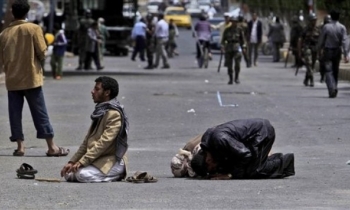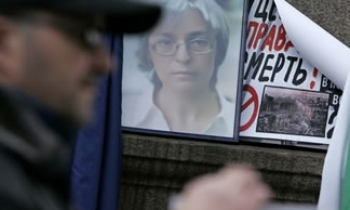The world sees London's tribulation through the eyes of Adam Stacey and the words of Matina Zoulia.
Their stories of the moments following the bomb blasts that struck the city during the Thursday morning rush hour captured public attention in a way that few news stories could. In other words, citizen journalism passed the breaking-news test.
Try not to lose yourself in Stacey's photograph of a frightened commuter, shot inside the crippled London Underground. Ponder Zoulia's weblog entry on the Guardian's Web site: "As I was going towards the [King's Cross station] exit there was this smell. Like burning hair. And then the people starting walking out, soot and blood on their faces. And then this woman's face. Half of it covered in blood."
This is the essence of reporting -- vivid, factual accounts of history as it explodes around us. People like me spend years in J-school learning how to do it just right. We spend the subsequent years subjecting you to the mixed results. Stacey, Zoulia and hundreds of other amateur journalists, packing camera phones and an urge to blog, reminded us how simple it should be.
The term "citizen journalism" is making the rounds among reporters and editors as newspapers try to keep the money rolling in while bloggers -- and their own Web sites -- raid their readership. I often hear it mentioned with the same desperate reverence that Dumbo gave his magic feather -- how it'll bring in fresh voices, followed by readers, then dollars.
You might wonder how this is different from what we've seen in the past. News operations have used the contributions of impromptu reporters from Abraham Zapruder to the dozens of video camera operators who started capturing naughty police episodes in the early 1990s (think Rodney King ). Community voices have always contributed to local and national papers.
Citizen journalism is different. It often covers a wide territory from soliciting arts and entertainment coverage to providing the angle on the city council budget that the cub reporter might have missed.
The London attacks moved the trend to a new level. Web sites from the BBC's to the Guardian's provided eyewitness accounts, some showing up as little as an hour or two after the first bomb went off. Rather than relying on unfocused, rambling blog entries, the London papers and the Beeb ran pithy postings from the people who were there. They ran alongside the staff reporters' accounts and presumably with the same amount of editing.
Nearly every U.K. news Web site this morning features similar accounts, along with forums for people to submit feedback and share their thoughts on the blasts. (See the inset above for a list of some of the more prominent news sites.)
It was a different way of doing things than when citizen journalism experienced its first big story in last December's tsunami, said Dan Gillmor, a former technology columnist at the San Jose Mercury News and current proprietor of the Bayosphere citizen journalism project.
The tsunami prompted bloggers to post thousands of video entries and journal-style stories that circulated the Internet in a huge swarm of unedited data. London, he said, showed how that data could be edited like traditional news and fill the gaps that the news could not.
The BBC didn't just give readers and eyewitnesses the power to share their stories. It also let reporters file brief accounts of what they saw. Here is one interesting observation from Dominic Casciani: "The evening commute home from the City of London has began in a way that people have not seen before.Hundreds and hundreds of city workers are walking the length of Whitechapel Road, packing the pavements, because there is no other way they can leave their offices. The A-Z map of the capital is fast becoming ubiquitous --but it is strange to see so many Londoners carrying them, not knowing how to make their way home on foot."
News outlets here in the States filed stories on the technology that allowed amateur reporters to shine:
- My colleague at The Washington Post, Yuki Noguchi, wrote about how the increasing amount of people using camera phones contributed to compelling amateur journalism: "Camera phones, once a novelty, now outsell digital cameras by about 4 to 1, according to analyst data. As more sophisticated phones and higher-speed networks have become available, wireless companies have recently started offering video camcorders on their phones that can nearly instantly transmit moving pictures over e-mail or onto the Internet."
- The Los Angeles Times filed a similar report: "The video provided an immediate and intimate look at the scene but was hardly polished or professional. That's because it was shot not with television cameras but with mobile phones -- the first widespread use of that technology in covering a major breaking news story. Loaded with features including text messaging, video games, cameras, live TV and the ability to record and transmit video through the Internet, the phones have become must-have items, especially among teens. They've been banned as voyeuristic irritants -- or worse -- at venues ranging from schools to Hollywood movie screenings. But, as they proved in London on Thursday, they can also provide a ground-level view of history. 'You forget how many people have these phones now and how much more of the first minutes of an event you're going to see,' said Chuck Lustig, director of foreign news coverage for ABC."
- Newsday quoted New York University journalism professor Jay Rosen as saying that the British media is several steps ahead of us in using reader contributions: "There's no comparison in what the BBC is doing and what we've seen here."
With any luck, the performance of Great Britain's daily papers and their Web sites will take us beyond the blogging-versus-journalism debate. They showed us regular people keeping their wits about them in a traumatic situation, and sharing what they experienced with the rest of us. The news staffs showed that they could blend that with their professional operations.
Let's hope that the next opportunity to test this relationship occurs under happier circumstances.









